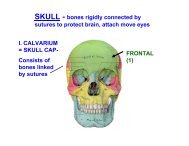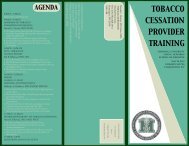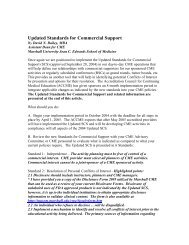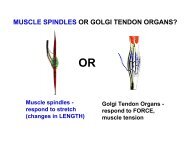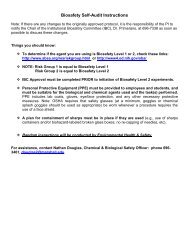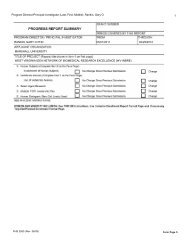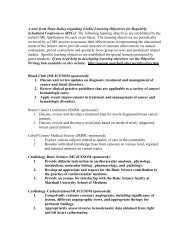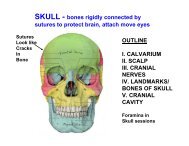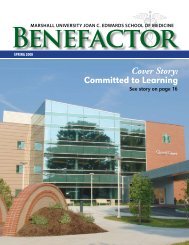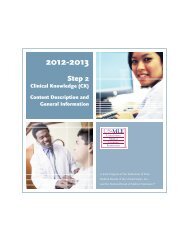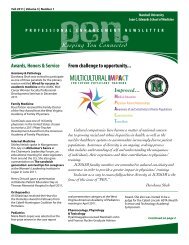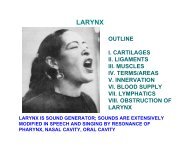Keeping You Connected - Joan C. Edwards School of Medicine ...
Keeping You Connected - Joan C. Edwards School of Medicine ...
Keeping You Connected - Joan C. Edwards School of Medicine ...
Create successful ePaper yourself
Turn your PDF publications into a flip-book with our unique Google optimized e-Paper software.
Fall/Winter 2009 | Volume 2 | Number 2<br />
2<br />
scholar<br />
spotlight<br />
Gary Rankin: Setting the bar<br />
high in teaching and research<br />
Gary O. Rankin, PhD, is pr<strong>of</strong>essor and chair <strong>of</strong> the Department<br />
<strong>of</strong> Pharmacology, Physiology and Toxicology. He received<br />
his doctoral degree from the University <strong>of</strong> Mississippi in<br />
medicinal chemistry and after completing postdoctoral<br />
training at the Medical College <strong>of</strong> Ohio joined the faculty<br />
<strong>of</strong> the medical school in 1978 as one <strong>of</strong> the four original<br />
members <strong>of</strong> the Department <strong>of</strong> Pharmacology. He became<br />
chair in 1986.<br />
Dr. Rankin has published more than 135 peer-reviewed<br />
articles and 15 book chapters, primarily in the fields <strong>of</strong><br />
pharmacology and toxicology. His research has appeared in<br />
many prestigious scientific journals, including the Journal<br />
<strong>of</strong> Pharmacology and Experimental Therapeutics, Toxicology and Applied<br />
Pharmacology, Toxicology, and the American Journal <strong>of</strong> Physiology.<br />
With funding from several agencies including the National Institutes <strong>of</strong> Health,<br />
his research has mainly focused on how chemicals induce toxicity to the kidney.<br />
Dr. Rankin has examined mechanisms by which drugs (antiepileptic drugs),<br />
agricultural agents (fungicides, herbicides) and industrial chemicals (halogenated<br />
anilines) are converted to toxic intermediates (metabolites) by the body and how<br />
these metabolites damage kidneys. His laboratory, in conjunction with the West<br />
Virginia Office <strong>of</strong> the Medical Examiner, is also examining how pharmacogenetics<br />
(altered DNA) may play a role in unexpected death due to the drug methadone.<br />
He is the principal investigator for the West Virginia INBRE award from the<br />
National Institutes <strong>of</strong> Health. This program involves Marshall University, West<br />
Virginia University and numerous West Virginia primarily undergraduate<br />
institutions (PUIs) with goals that include improving the biomedical research<br />
capacity and competitiveness <strong>of</strong> the State and providing research opportunities<br />
for undergraduate students at PUIs. An important part <strong>of</strong> this award is the<br />
Appalachian Cardiovascular Research Network (ACoRN) which studies the role<br />
<strong>of</strong> genetics in cardiovascular disease. The program also hosts undergraduate<br />
students at Marshall University and West Virginia University in a summer<br />
biomedical research program each year.<br />
Dr. Rankin has been active in leadership roles in many pr<strong>of</strong>essional organizations,<br />
including serving as president <strong>of</strong> the Association <strong>of</strong> Medical <strong>School</strong><br />
Pharmacology Chairs, Mechanisms Specialty Section <strong>of</strong> the Society <strong>of</strong> Toxicology,<br />
and the Division <strong>of</strong> Toxicology for the American Society for Pharmacology and<br />
Experimental Therapeutics.<br />
Invited Speaker<br />
Biochemistry and Microbiology<br />
Vincent E. Sollars gave an invited talk at the 2009 annual research retreat for<br />
the Mary Babb Randolph Cancer Center at West Virginia University. His topic<br />
was “Omega 3 fatty acids reduce myeloid progenitor cell frequency in the<br />
bone marrow <strong>of</strong> mice and promote progenitor cell differentiation.”<br />
Meeting Presentations<br />
Anatomy and Pathology<br />
Darshana Shah presented “Art and<br />
science <strong>of</strong> teaching” at the Association<br />
<strong>of</strong> American Medical Colleges’ Early<br />
Career Woman Faculty Pr<strong>of</strong>essional<br />
Development Seminar in July. At<br />
the AAMC’s Group on Faculty Affairs<br />
Pr<strong>of</strong>essional Development Conference in<br />
San Francisco in August, she presented<br />
a workshop titled “How to keep the fire<br />
burning without being consumed by the<br />
flames” with Terri Turner and Charlene<br />
Dewey, as well as a poster titled “Getting<br />
<strong>of</strong>f the ground: junior faculty mentoring<br />
program at Marshall University.”<br />
Biochemistry and Microbiology<br />
Aaron Holley, Kelley Kiningham, Douglas<br />
Spitz, Dean <strong>Edwards</strong>, Jeffrey Jenkins and<br />
Michael Moore presented “Progestin<br />
stimulation <strong>of</strong> manganese superoxide<br />
dismutase and invasive properties in<br />
T47D human breast cancer cells” at the<br />
annual meeting <strong>of</strong> the Endocrine Society,<br />
Washington, D.C., in June.<br />
Hongwei Yu presented a poster<br />
describing the role <strong>of</strong> the mucoid<br />
bi<strong>of</strong>ilm-coupled protein LptF in P.<br />
aeruginosa at the American Society<br />
for Microbiology meeting in May in<br />
Philadelphia. Co-authors were graduate<br />
students Heath Damron and Jennifer<br />
Napper.<br />
Family and Community Health<br />
Kathleen O’Hanlon presented on<br />
“Chemical peels, microdermabrasion<br />
and medical aesthetic skin care” at the<br />
American Academy <strong>of</strong> Family Physicians’<br />
Annual Assembly in Boston in October.<br />
She also gave an invited talk on “Skin<br />
Problems and Diseases” at Newport<br />
Beach, Calif., in June.<br />
Internal <strong>Medicine</strong><br />
Tae Hoon Lee (PGY 3) and Joe E. Gerges<br />
El Khoury presented a case report on<br />
ranitidine-induced hepatitis as a poster<br />
at the October meeting <strong>of</strong> the American<br />
College <strong>of</strong> Gastroenterology in San<br />
Diego.<br />
Continued on page 3



